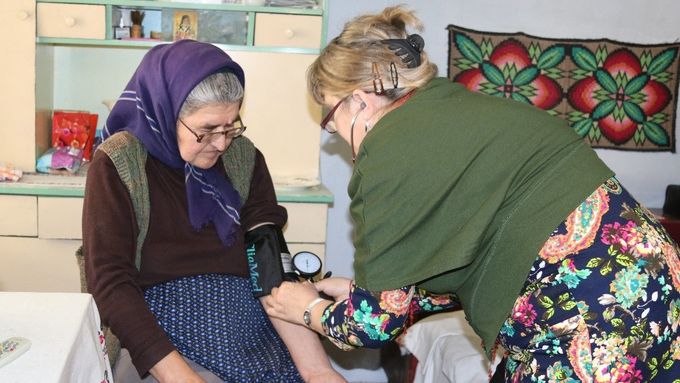Swiss Support to Healthcare Provision in Romania
17.12.2019
From 2012-2019, Swiss TPH collaborated with the Swiss Agency for Development and Cooperation (SDC) to assist in the Romanian integration process into the EU in the area of health systems strengthening. Swiss TPH supported the Romanian population through project facilitation that improved access to health and social services to the most vulnerable populations, such as training programmes for emergency care services, ultimately contributing to the goal of Universal Health Coverage.

(Switzerland supports ongoing healthcare reforms in Romania. Photo credit: Swiss TPH)
The public health system in Romania faces major challenges, despite considerable progress in recent years. The infant mortality rate remains the highest in the European Union (EU), and life expectancy is low in relation to the EU average, with the average life expectancy for a woman being 79.1 years and 71.7 years for a man.
The large migration of medical professionals to Western Europe and a struggling economy are an additional burden to the health sector. Thus, Romanian authorities have vested interests in health system reform to not only improve basic healthcare services, but to also make the health labour market more attractive.
Switzerland has supported the Romanian Government in its health sector reform for nearly 20 years. Its current support of the Romanian EU integration process in health focuses on intensive care and emergency medicine as well as facilitating access to basic medical care in remote regions. The Swiss Agency for Development and Cooperation (SDC) partnered with Swiss TPH to support the implementation of the following health-related projects by bringing Swiss expertise to Romania:
A. Community integrated health and social services
B. Improved quality of emergency services
C. Improved quality of services in pediatric intensive care
D. SIMLAB - a national training system for simulation in anaesthesia and intensive care
Community integrated health and social services
Community Care Centres were developed to provide basic medico-social services at a community level to vulnerable populations. In total, over 100 homecare workers and community nurses were trained; over 300 elderly people received support for daily activities; and over 200 children receiving services in their communities, such as afterschool services and psychological counselling.
Improved quality of emergency services
Swiss TPH worked towards the improvement of pre-hospital and hospital emergency services through the creation and implementation of training programmes modelled after the European standard of emergency training. Following the update of the existing curriculum for emergency training and the development of respective teaching materials, over 100 physicians and nurses were trained. Additionally, a training program for emergency dispatch agents was developed and implemented.
Improved quality of services in pediatric intensive care
Developing a new speciality for paediatric intensive care was on the priority list of the Romanian Ministry of Health for quite some time. Romanian and international experts developed and introduced a two-year professional development programme, which enables paediatricians to specialise in the intensive care of children.
SIMLAB: a national training system for simulation in anaesthesia and intensive care
Simulation training is an internationally recognised method to enhance continuous professional development for health professionals and teamwork. Swiss TPH has supported simulation training in Romania since early 2000 with the SDC funded Neonatology project. The current SIMLAB project was unique in that it introduced patient simulators for education and training in anaesthesiology and intensive care as well as in emergency services, which allowed physicians and nurses in all of the five leading universities to enact realistic emergency scenarios. It also supported the universities towards the creation of sustainable simulation training centres (STCs) through the development of modern and accredited simulation training curricula and scenarios. In total, 40 instructors were trained. Project collaborators included the University of Basel and the University of Munich.
"It is our job to build upon these partnerships"
While significant progress has been made in Romania over the past seven years in regards to healthcare provision, much work lies ahead as gaps prevail, hindering the country from achieving Universal Health Coverage.
"We were able to bring Swiss expertise and other international expertise to Romania and establish national and international professional networks, which continue to function even after the end of the collaboration. Connecting hospitals from Switzerland and Romania, mobilise resources and share knowledge within the country and help develop long lasting professional relationships," said Manfred Zahorka, Project leader of the Romanian projects at Swiss TPH. "Building upon these partnerships in order to continue improving health outcomes for the Romanian population will be the future job of Swiss and Romanian partners."
- Thematic Fund Health Romania
- Community Integrating Health and Social Services
- Quality Improvement for Paediatric Intensive Care
- National Training System for Simulation in Anaesthesia & Intensive Care and other Specialities
- Improving quality of pre-hospital and hospital emergency services
- Swiss Romanian cooperation for widening access to health and social services
- Swiss Contribution to Increasing Health Services Quality in Romania (Video)
Stay connected
Subscribe to our newsletter and get all the latest research news, project updates, course and event listings from Swiss TPH.